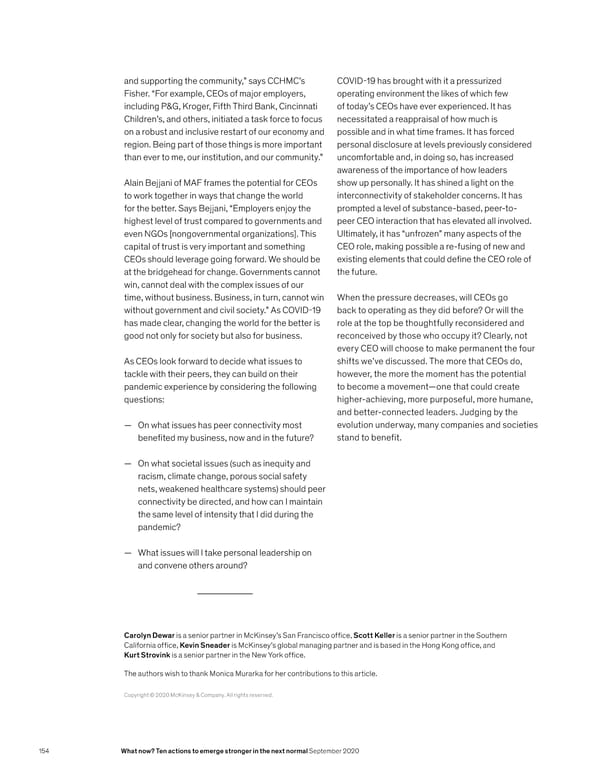and supporting the community,” says CCHMC’s COVID-19 has brought with it a pressurized Fisher. “For example, CEOs of major employers, operating environment the likes of which few including P&G, Kroger, Fifth Third Bank, Cincinnati of today’s CEOs have ever experienced. It has Children’s, and others, initiated a task force to focus necessitated a reappraisal of how much is on a robust and inclusive restart of our economy and possible and in what time frames. It has forced region. Being part of those things is more important personal disclosure at levels previously considered than ever to me, our institution, and our community.” uncomfortable and, in doing so, has increased awareness of the importance of how leaders Alain Bejjani of MAF frames the potential for CEOs show up personally. It has shined a light on the to work together in ways that change the world interconnectivity of stakeholder concerns. It has for the better. Says Bejjani, “Employers enjoy the prompted a level of substance-based, peer-to- highest level of trust compared to governments and peer CEO interaction that has elevated all involved. even NGOs [nongovernmental organizations]. This Ultimately, it has “unfrozen” many aspects of the capital of trust is very important and something CEO role, making possible a re-fusing of new and CEOs should leverage going forward. We should be existing elements that could define the CEO role of at the bridgehead for change. Governments cannot the future. win, cannot deal with the complex issues of our time, without business. Business, in turn, cannot win When the pressure decreases, will CEOs go without government and civil society.” As COVID-19 back to operating as they did before? Or will the has made clear, changing the world for the better is role at the top be thoughtfully reconsidered and good not only for society but also for business. reconceived by those who occupy it? Clearly, not every CEO will choose to make permanent the four As CEOs look forward to decide what issues to shifts we’ve discussed. The more that CEOs do, tackle with their peers, they can build on their however, the more the moment has the potential pandemic experience by considering the following to become a movement—one that could create questions: higher-achieving, more purposeful, more humane, and better-connected leaders. Judging by the — On what issues has peer connectivity most evolution underway, many companies and societies benefited my business, now and in the future? stand to benefit. — On what societal issues (such as inequity and racism, climate change, porous social safety nets, weakened healthcare systems) should peer connectivity be directed, and how can I maintain the same level of intensity that I did during the pandemic? — What issues will I take personal leadership on and convene others around? Carolyn Dewar is a senior partner in McKinsey’s San Francisco office, Scott Keller is a senior partner in the Southern California office, Kevin Sneader is McKinsey’s global managing partner and is based in the Hong Kong office, and Kurt Strovink is a senior partner in the New York office. The authors wish to thank Monica Murarka for her contributions to this article. Copyright © 2020 McKinsey & Company. All rights reserved. 154 What now? Ten actions to emerge stronger in the next normal September 2020
 What Now? Page 155 Page 157
What Now? Page 155 Page 157